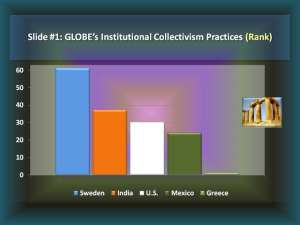Institutional Collectivism
Institutional Collectivism (InstC), which is one of globe model’s nine societal dimensions, refers to individuals being encouraged by society’s institutions to be integrated into groups and organizations within the society. Collective distribution of resources and collective action are encouraged and rewarded by organizations and by society.
How InstC is measured
If we want to get a better idea of how InstC was operationalized (defined for measuring), we can look at some of the questions representing the construct on the English-language version of the globe instrument. On that basis, here goes:
In a high-InstC society:
– Leaders encourage group loyalty even if it means that individual goals must be compromised.
– Being accepted by the other members of one’s group is very important.
– Group cohesion is valued more than individualism.
– Leaders encourage group loyalty even if it means that individual goals must be compromised.
– Being accepted by the other members of one’s group is very important.
– Group cohesion is valued more than individualism.
In a low-InstC society:
– The economic system is designed to maximize individual interests instead of collective interests.
– Individualism is valued more than group cohesion.
If you read and understood my recent column on In-Group Collectivism (IngC), which was the other form of Collectivism (COLL) measured by Project GLOBE, you may be thinking that InstC sounds a lot like IngC in terms of allegiance and loyalty to groups.
– The economic system is designed to maximize individual interests instead of collective interests.
– Individualism is valued more than group cohesion.
If you read and understood my recent column on In-Group Collectivism (IngC), which was the other form of Collectivism (COLL) measured by Project GLOBE, you may be thinking that InstC sounds a lot like IngC in terms of allegiance and loyalty to groups.
Two types of COLL seem similar
I can’t argue with you there as the two types of COLL are not completely distinct for me either. Keeping in mind that globe model’s respondents were middle managers in 61 countries, let’s look at U.S. results in context – and as illustrated by the slides above.
– Slide #1: Ranking 30th from the top, the U.S. is in the middle of the pack on InstC. Sweden ranks highest, while Greece is at the bottom. An acquaintance who grew up in Sweden but now lives in England tells me that she and her husband are considering moving back to Sweden as their children grow up because their college education will be covered by the government. She also describes Swedish nationals as being very much like one another in demeanor, dress and personal style. So could it be that Sweden is one giant collective?
At the other extreme, we have Greece, which always seems to be in the news on the basis of economic difficulties. An international marketing professor who attends my cross-cultural presentations tells me that Greece also provides for the education of its citizens, but those citizens graduate with advanced degrees only to find that there are no jobs for them – and the anger arising from this unfortunate combination of circumstances is one source fueling Greece’s societal angst.
If either of these scenarios needs correcting or explication, I hope that readers in Sweden and Greece will write. Both accounts have me wondering whether InstC might be capturing something along the lines of how well one’s government looks out for its citizenry.

If either of these scenarios needs correcting or explication, I hope that readers in Sweden and Greece will write. Both accounts have me wondering whether InstC might be capturing something along the lines of how well one’s government looks out for its citizenry.

– Slide #2: South Korea is the country with the greatest desire for lower InstC, followed by Sweden (not shown). Greece shows the highest desire for higher InstC, which I think lends credence to the possibility that InstC captures something that may be related to security and stability for its citizens.
And look at the U.S. As a nation, we are almost completely satisfied with our InstC. This makes sense, given that globe respondents are middle managers (with jobs and health insurance). If I could make a personal observation rather than an evidence-informed one, U.S. Americans who earn a paycheck and work hard for what they have also have a very low tolerance for those whom they believe can work but don’t, as well as co-workers who do not carry their own weight.
And look at the U.S. As a nation, we are almost completely satisfied with our InstC. This makes sense, given that globe respondents are middle managers (with jobs and health insurance). If I could make a personal observation rather than an evidence-informed one, U.S. Americans who earn a paycheck and work hard for what they have also have a very low tolerance for those whom they believe can work but don’t, as well as co-workers who do not carry their own weight.
– Slide #3: No surprises here, really. On cultural distance, Greece is furthest from the U.S. in wishing to be higher on InstC, while South Korea comes in at the other extreme.
Finally, perhaps one reason that InstC may be difficult to understand as a construct is precisely because it does not seem to be a source of collective dissatisfaction. The esteemed cultural anthropologist Edward T. Hall emphasized that those within a culture are often challenged to define it unless they can remove themselves and view it as an outsider. Perhaps InstC is difficult to recognize precisely because it’s not much of a pain point.


No comments:
Post a Comment